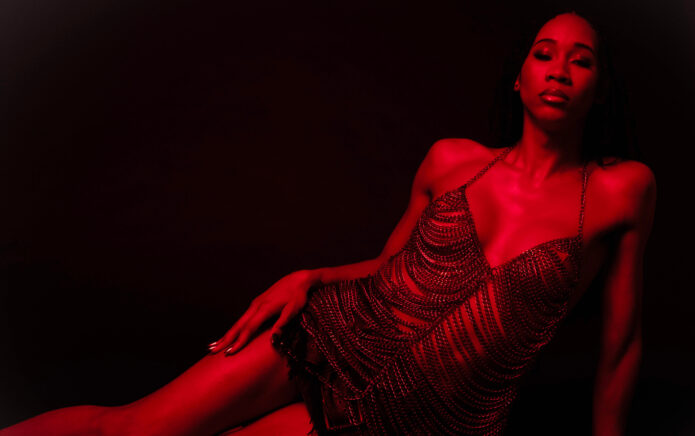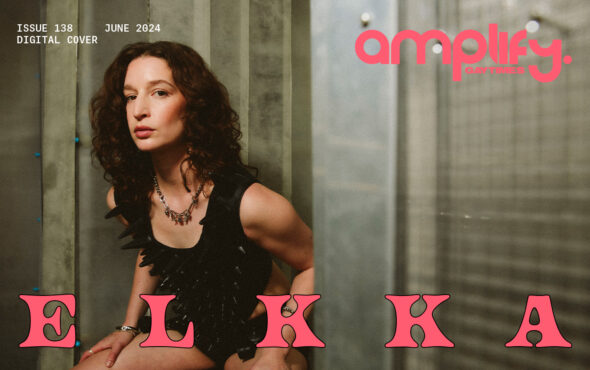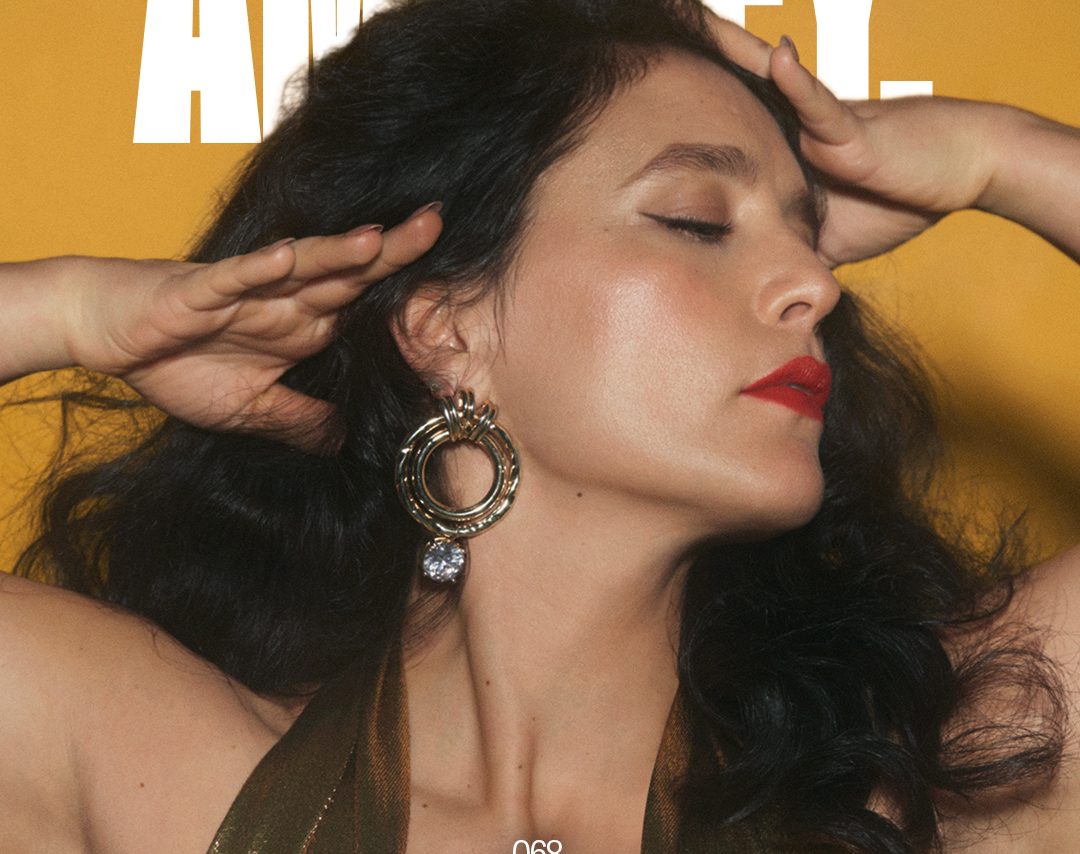
Sometimes life has a funny way of figuring out giving us what we need, when we need it. For her fourth album, What’s Your Pleasure?, Jessie Ware turned to disco as a vessel to hitch-hike to another reality and create a world of optimism and fantasy for herself. The coincidence here is that the album is being released during the biggest global health and economic crisis for a generation, when the world needs a moment to escape and its mood lifted.
“Not that I think my music is going to save the world at all,” she says over the phone from her London home. But what the album does provide is some much-needed joy right now. What’s Your Pleasure? is brimming with sensuality and elation, paying homage to the great disco icons of the past while remaining faithful to Jessie Ware as a singer and a songwriter.
Disco was born out of the queer Black community of New York City in the early 1970s, during an era of monumental LGBTQ+ liberation and civil rights movements protesting discrimination and social injustice. It’s not lost on Jessie that, more than 50 years later, these are issues that still remain. “Everyone knew disco, but I didn’t fully understand the significance of it as a genre for the queer community and the Black community as much,” she says, adding that it was during the making of this record that she delved into the history.
Here we speak to Jessie about the enduring power of disco, how she considers this album to be a “thank you” to the LGBTQ+ community for their support, and why it’s important to use her platform to raise the voices of marginalised communities.
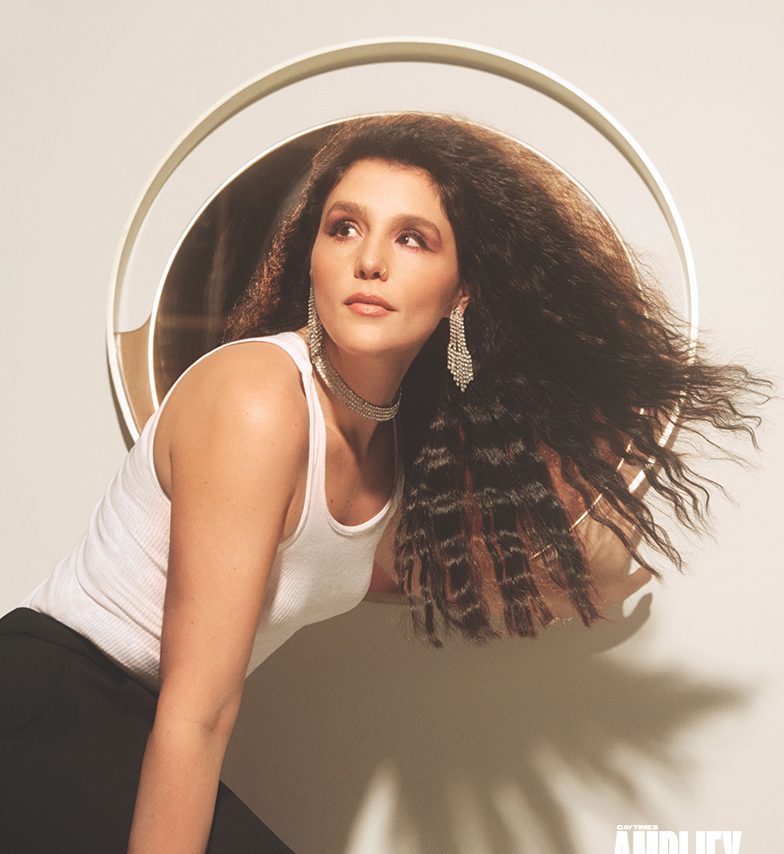
You’ve always had elements of dance through your music – whether it was electronica, soul, rhythm – but what drew you to the world of disco and funk for this record?
I started in the dance and electronic world where I was being a featured vocalist, whether it was on a SBTRKT song or with DJ Joker, and so disco for me had the sophistication and warmth I felt I needed to have. The sophistication was there on previous music, but definitely the warmth aspect I was really needing. The energy, the OTT-ness and the optimism was everything that I needed at that time.
Optimism is a great word for it, but this record is pure escapism and elation. Is that the role you see of music in your life at this point?
I was unaware that Dua Lipa had made a version of a disco record, and Gaga has, and now I have, and none of us were talking about what we were doing. I adore both of their new albums. It’s a really dark, low time in history right now and it’s been a horrendous year for a lot of people. It’s interesting how – from what I understand – disco has these real revivals in times of political and social crisis. Not that I think my music is going to save the world at all, but I find it interesting how that happens in a cyclical nature. For me, I think at the moment it’s the kind of music that… I think ‘elation’ is such a great word to use. It’s needed at the moment.
Obviously this was initially intended to be released in a very different world and time. How has the current global climate changed the meaning of what this album can represent to listeners for you?
Selfishly, the record was initially made for me to be able to escape to another world and another reality – to daydream and fantasise with this direct flirtation and sensuality. Releasing the music during this time, songs like Save A Kiss take on a new meaning. At the time the music video came out, we weren’t allowed to see other family members we weren’t living with. So it had a new poignancy to it. But when I wrote it, it was about me feeling guilty about being late back home, and being like, ‘Save a kiss for me tonight – I promise you I won’t be long’. I guess with the escapism, people need a bit of that. If I can offer that hour of escapism and joy to distract them from the realities of what’s gong on at the moment, I think that’s a service I’m hoping to deliver. Although yes, I thought we’d all be together celebrating this release, it’s been amazing – however naff this sounds! – that there’s this connection with my fans and with music that I think people have an appetite for. I’m really thankful for that.
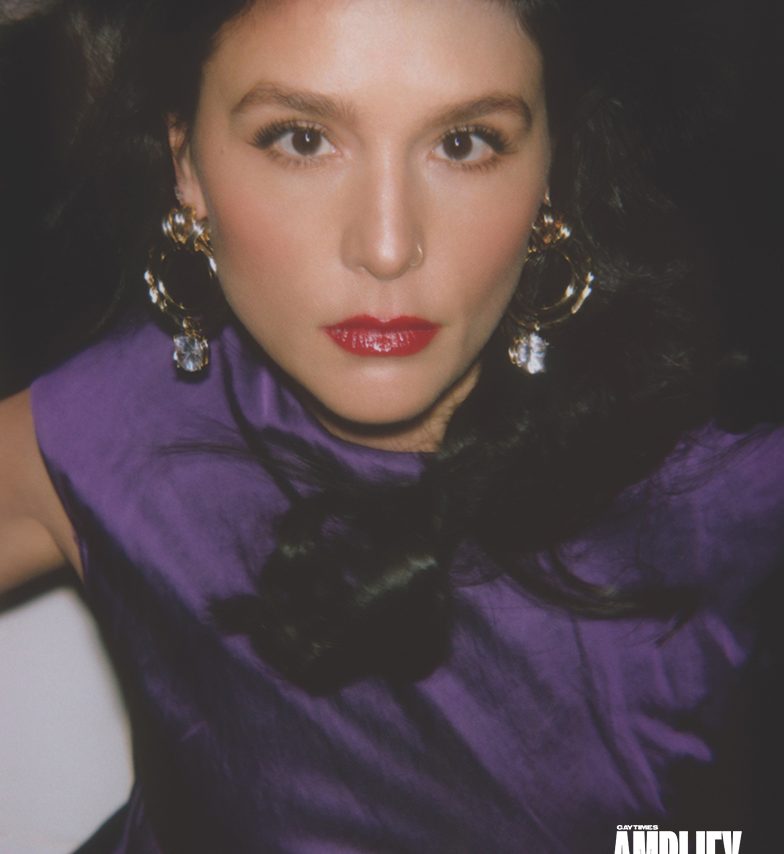
This album is coming at a time when it is Pride Month and we have the Black Lives Matter movement at full force. Disco has such a rich history – especially at the intersection of queer and Black communities – so when did first discover the story behind the genre?
It was very much during the making of this record. I felt like I needed to read up a little bit more, so I started reading Love Saves The Day and understanding it. I’ve still got so much to learn. Even just watching Pose. I love that show. Everyone knew disco, but I didn’t fully understand the significance of it as a genre for the queer community and the Black community as much. By complete chance, this record is coming out during a rising of an incredible and important movement and also Pride Month.
When you’re working on an album that is heavily influenced by disco, how did you ensure that the music pays homage to those that have come before you?
It was definitely paying homage and not making it feel pastiche. I didn’t want it to feel like a ‘retro’ record. I wanted it to have the nods to elements, whether that’s Blondie or Fern Kinney. I learnt from James Ford through Harry Midland – the producer – the significance of Fern Kinney’s record Love Me Tonight. Apparently during the AIDS epidemic in New York, this would be the closing song they’d play [at clubs]. It’s such a beautiful song. So many people were losing their loved ones and friends and it became really significant. I was so intrigued by the story. I love that song but it takes on a whole new significance now I know the history and the context of it. I wanted this album to feel modern, but there are definitely huge nods to Earth, Wind & Fire, Minnie Riperton, Donna Summer, Blondie, they’re there and I want people to enjoy that.
Disco was a catalyst for women to become more sexually liberated within music – Donna Summer being the ultimate example. The music industry has come a long way since, but do you think misogyny around female artists still exists not only in a business dominated by men, but a world dominated by men?
Yeah I do. I think it’s quite casual and masked. But yeah, I do think there is. I’ve said this before, but I think women have a shelf life. There’s this constant need for women to have to reinvent themselves. I have definitely felt that unspoken pressure, I guess. With this record, it was so emancipating because I wasn’t really trying to reinvent myself at all. In fact I was trying to return to something, whilst also trying to feel like I was gaining my independence back in not having to feel like I have to defer to middle-aged men. To feel like I don’t really care if I’m pleasing them or not. I was just trying to feel and enjoy it again. To feel free. The house music groove and disco element was my vessel for that. It was incredibly freeing.
LGBTQ+ audiences have always had a kinship with female artists because they recognise that struggle against the patriarchy – especially when it comes festival line-ups, conversations around what’s considered to be ‘real music’ and how pop performance somehow reduces musicianship. Is that something you’ve recognised during your time in music?
It’s so funny you say that because I totally fell into that trap. Even with promoting the last record I felt like I was at album three and wanted to be taken – I say in inverted commas – ‘seriously’. I wrote this record about struggles with being a new parent and relationships and whatever, but regarding how I performed it, I felt the need to get extra band members to legitimise that live feel. In hindsight, that was so ludicrous. It’s quite archaic in a sense. It falls into that pressure of what’s considered ‘real music’. I couldn’t afford to do my shows because it was so expensive to put them on! It was just a stupid, stupid idea and kind of mis-managed. My idea for this record was that I wanted it feel as malleable as possible. Also the fact that I could strip it down if needed to be just a DJ and me with two backing singers and we’d dance, or you could bring it out to be with guitarists and a drummer. Or, if you really want to fucking go for it, you go for the orchestra at the Royal Albert Hall, which I totally intend to do on this record. I do think there are moves forward. Emily Eavis [Glastonbury Festival organiser] is incredible. As is Annie Mac with Lost & Found. I can see people – predominantly women – trying to sort out the change in it being slightly more equal.
LGBTQ+ audiences see that and that’s why they support female artists so much.
I have always felt that support from the LGBTQ+ community. I felt it immediately. The loyalty, the devotion and enthusiasm towards me has made the community so important to me in being able to carry on as an artist. This album was a form of a thank you to the community, with them totally in mind to be able to have that safe space where we can dance, feel free and express yourself. Where you don’t have to quieten yourself down. I’ve had such generosity from that community that I feel indebted to them.
The LGBTQ+ community appreciates you as a vocal and visible ally…
That is so lovely.
Is that something that comes naturally to you, or are you someone that will go out of your way to educate yourself on the issues?
At the risk of sounding… so my brother is gay and I think a lot of my fans are aware of that. I’m always trying to set him up. He came as ‘my nanny’ on the tour when we did Glasshouse, and I did a callout every night. So he’d be looking after my daughter and he’d be so annoyed… I remember my husband and him asked who would have Berlin as the night off! I’m constantly trying to learn and my brother is an incredible educator for that. I feel incredibly protective of that community.
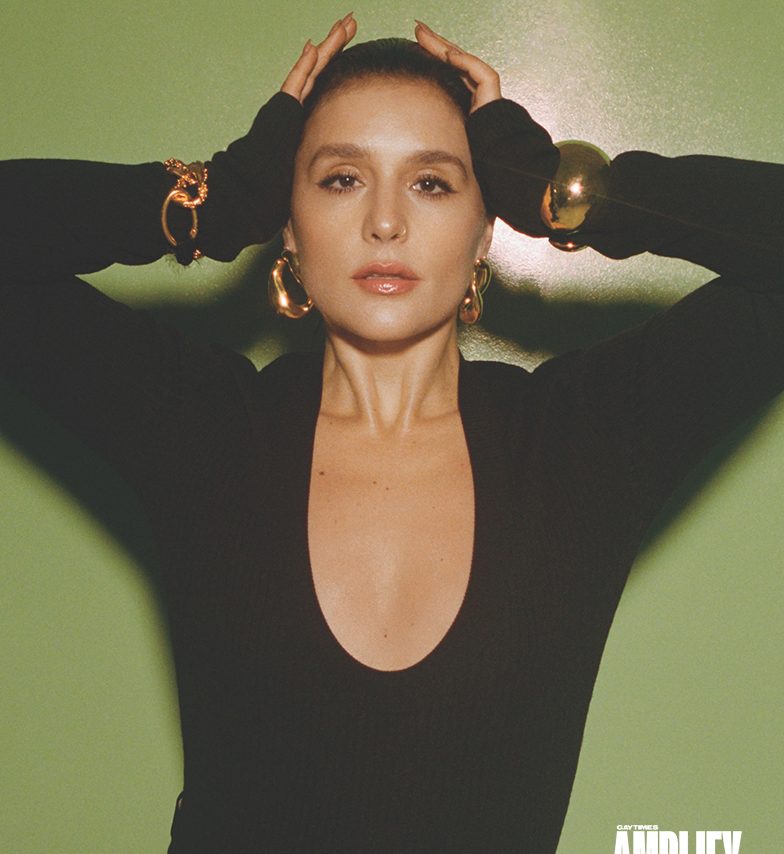
Did any of the callouts ever work for your brother?
He’d never fucking tell me! Never ever. But I definitely know that he picked somebody up… oh my god he’s going to kill me. I can’t say it! I definitely know that potentially my name has been dropped in a Grindr chat before.
The perks of being your brother, right?
[Laughs] I think he’d say it’s a perk! It’s funny because he’s a doctor and I got this DM as there was a midwife who found out through someone that my brother was related to me and they worked with him, so they asked for a shoutout – and I’m very happy to do wedding congratulations or birthday wishes – but as soon as they dropped his name I was like, ‘I can’t not do it now because Dr. Alex will get a bad rep’. She didn’t even know who I was, she’d just heard that Dr. Alex’s sister was a famous singer!
You’re four albums in so you’re at that point now where you have a rich body of work to draw upon. When you reflect on your career so far, what are your favourite moments and what do you wish you’d approached differently?
I’m proud of making this record and protecting myself around this record and really remembering what my mentor from the first record, Dave Okumu, said to me about ‘you’ve got to make the record that you’ve got to stick with, because if nobody else buys it you’re the one who is stuck with it’. I think I lost myself for a little bit. I wish I’d appreciated what had happened at the beginning. I was so scared by the rise in my career and I didn’t think it was deserved. So I wish I’d actually just owned it a bit more, and not apologised so much. That’s something I regret. Instead I was always scared about what was around the corner because I felt like I was going to be found out. So yes, on the fourth record you kind of feel like you’ve bedded in a bit now, and people are still sticking around.
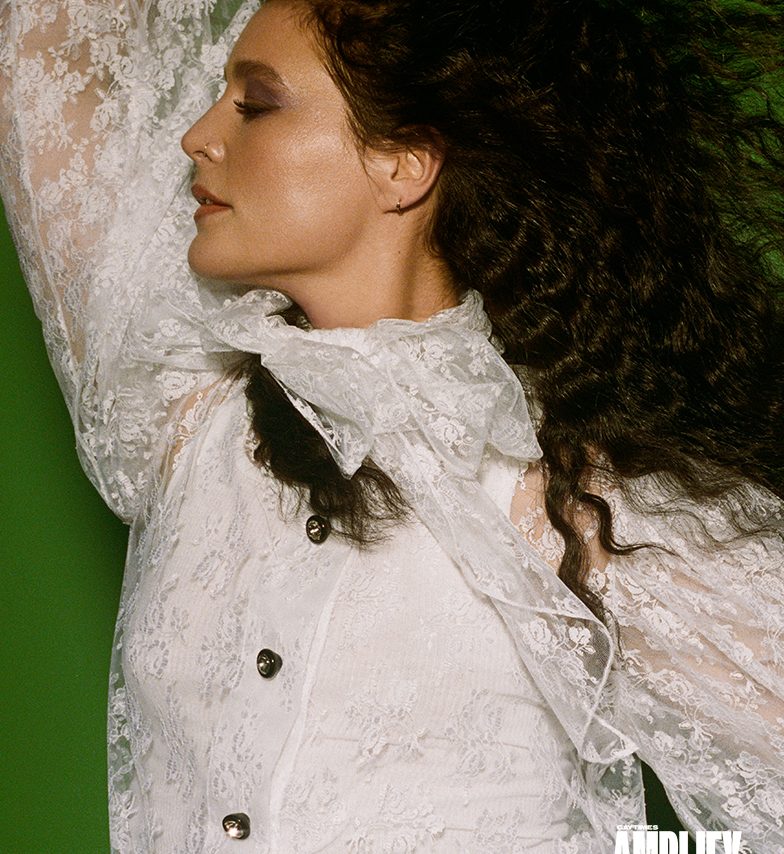
I have to mention your podcast Table Manners because that has been such a great success story for you…
Thank you! I think my mum is more of a gay icon now than me!
Mums always are though! The gays love a fabulous mum.
The way they adore my mother, it’s unbelievable!
You recently had Munroe Bergdorf on as a guest which, as you said, is tremendously important in this moment to be shining a spotlight on a leading Black trans voice like hers. How important is it to you as someone who’s an ally to the community to platform marginalised voices knowing you have an audience that may not always encounter these voices and experiences?
It’s so important. I went to the Black Lives Matter protest in Hyde Park on Saturday and it was very LGBTQ-focussed and I listened to these stories and I feel it’s my duty. I have a platform that’s not as big as other people’s, but it’s a platform, and I owe it to these people to be able to share their stories. I will constantly support and stick up for these communities. Even if my platform is there to share somebody else’s words, hopefully that is me doing some sort of good. I’ve been following Munroe for years and I learn a lot from her. She is a really important voice. It’s a pleasure to be able to have these conversations with people, and promote it on my platform. Also to have her speaking with my mum and the whole inter-generational aspect. My mum is learning too. How Munroe handled the L’Oreal thing with such grace, I don’t know if we kept this in the final podcast, but my mum said ‘That is real activism. That is progress.’ Munroe didn’t say, ‘F off, I’m never speaking to you again,’ she’s working with them and she’s going to try and better it. Munroe is an incredibly brilliant activist.
Jessie Ware’s new album What’s Your Pleasure? is out now.
